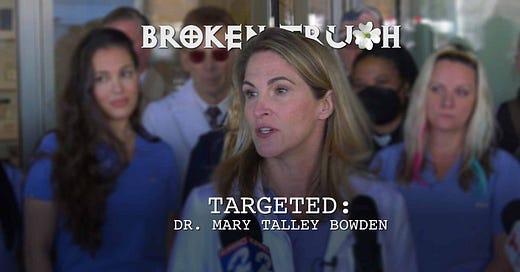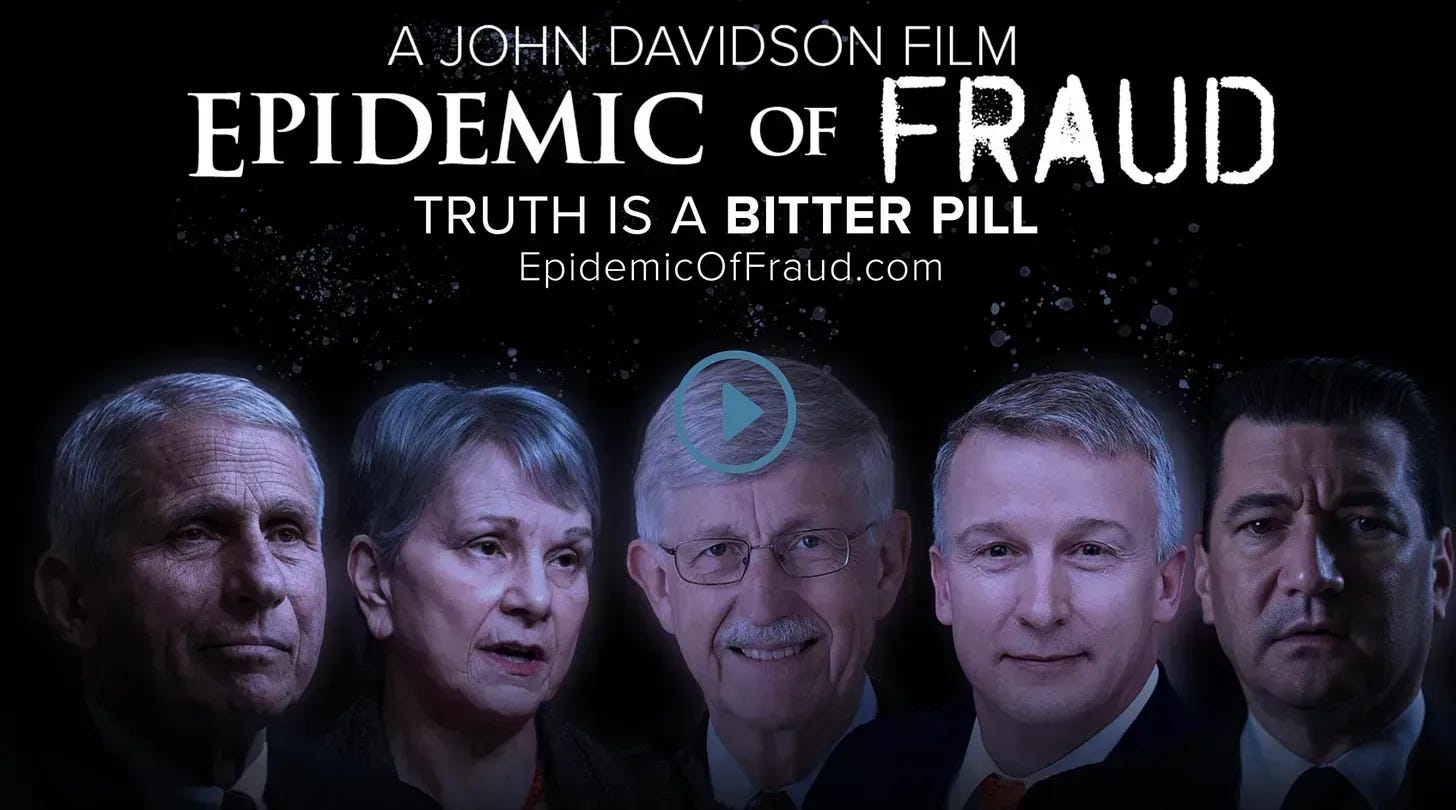In 2023, Dr. Mary Talley Bowden, an ear, nose, and throat (ENT) specialist, emerged as a polarizing figure in the medical community after stepping into the contentious arena of COVID-19 treatment. During an interview on BrokenTruth.TV with hosts John Davidson and R. Clinton Ohlers, she shared her journey from a relatively low-profile physician to a vocal advocate challenging mainstream narratives around COVID-19 protocols, particularly regarding the use of ivermectin. Her story, which gained further prominence after an appearance on Tucker Carlson’s podcast, highlights the intersection of medical practice, institutional pushback, and the intense online harassment she faced—potentially orchestrated by groups with ties to pharmaceutical interests.
An Unexpected Role in COVID-19 Care
Initially, Dr. Bowden’s practice focused on typical ENT concerns, but the pandemic shifted her trajectory. As patients sought help for COVID-19, she found herself filling a gap left by primary care physicians who, she observed, often advised patients to wait out the illness without intervention. Starting with basic treatments like breathing exercises, she later turned to monoclonal antibodies—until government rationing limited their availability. This led her to explore ivermectin, a drug that had been widely debated but dismissed by many health authorities.
Her decision to use ivermectin stemmed from a meticulous review of its safety profile, including its approval data submitted to the FDA, which showed a wide margin of safety even at high doses. She also tracked patient outcomes, noting a pattern of improvement that contradicted the prevailing skepticism about the drug’s efficacy. This hands-on experience, combined with her observations of vaccinated patients still contracting severe COVID-19, prompted her to speak out on social media platforms like Twitter, where she criticized vaccine mandates and championed ivermectin as a viable treatment.
Institutional Backlash and a Media Firestorm
Dr. Bowden’s public stance quickly drew attention—and ire. In November 2021, Houston Methodist Hospital, where she held limited privileges, suspended her, citing her social media activity as “dangerous misinformation.” The hospital’s decision to announce this action on Twitter was unprecedented, thrusting her into a media spotlight she hadn’t sought. She described the ensuing chaos as overwhelming, with journalists clamoring for interviews and detractors attacking her credibility.
The suspension, she argued, was more of a public relations maneuver than a substantive disciplinary action. Her ties to Houston Methodist were minimal—she hadn’t even set foot in the facility since obtaining privileges, which she maintained only for rare emergencies. Nevertheless, the hospital’s move sparked a defamation lawsuit, which, at the time of the 2023 interview, was facing a motion to dismiss from the hospital’s legal team. Dr. Bowden remained defiant, buoyed by support from patients and a growing network of advocates.
Harassment and Organized Opposition
Beyond institutional pushback, Dr. Bowden faced a barrage of personal attacks. Online groups, including one called “Shots Heard Around the World” with roughly 1,100 members, targeted her with vitriolic campaigns. These efforts included flooding Google with fake negative reviews—many from individuals she could prove were not her patients—and reporting her social media accounts to get them suspended. Her personal information, including her phone number and home address, was posted online, leading to spam calls and threatening messages. One incident involved an individual showing up at her office with a vague warning, prompting a police report.
The BrokenTruth.TV hosts uncovered evidence suggesting these attacks might not have been spontaneous. They pointed to connections between the harassment groups and organizations like the Public Good Project (PGP), a nonprofit with ties to Google, Rockefeller, UNICEF, and Yale. Some members of these groups were linked to pharmaceutical companies, such as Johnson & Johnson, and others had affiliations with hospitals involved in Pfizer vaccine trials. The discussion also highlighted “Team Halo,” a UN-verified initiative funded in part by the World Economic Forum, which trained influencers to promote official narratives—sometimes under pseudonyms—while silencing dissenting voices like Dr. Bowden’s.
Financial Incentives and Systemic Corruption
A key theme of the interview was the financial stakes driving the suppression of alternative treatments like ivermectin. The hosts argued that the Emergency Use Authorization (EUA) for COVID-19 vaccines and expensive drugs like remdesivir relied on the absence of viable alternatives. By promoting ivermectin, Dr. Bowden and others threatened this lucrative framework, which funneled billions in taxpayer money to hospitals, research institutions, and pharmaceutical companies. Houston Methodist, linked to the Methodist Healthcare System and potentially influenced by financial ties to groups like Vizient, exemplified this conflict of interest.
The conversation also touched on broader systemic issues, including fabricated studies—like the Surgisphere scandal that undermined hydroxychloroquine—and the role of influential figures like Scott Gottlieb, a former FDA commissioner and Pfizer board member, who allegedly pressured Twitter to censor claims about natural immunity. These revelations, bolstered by the Twitter Files released around that time, painted a picture of a coordinated effort to protect profitable narratives at the expense of patient care.
A Physician’s Perspective on a Divided Profession
Dr. Bowden offered insights into why many of her colleagues remained silent or dismissive. She attributed it partly to medical training, which emphasizes adherence to established standards over independent judgment, and partly to the shift in the profession toward hospital employment. Before policies like Obamacare, most doctors were independent; now, many work for organizations that dictate treatment protocols, leaving little room for deviation without risking their livelihoods. Her own independence as a solo practitioner gave her the freedom to prioritize patient outcomes over institutional agendas—a rarity in today’s healthcare landscape.
Triumph Over the FDA: A 2025 Update
Since the 2023 interview, Dr. Bowden’s fight has yielded significant victories. In a landmark lawsuit against the FDA, she and her co-plaintiffs successfully challenged the agency’s campaign against ivermectin. The FDA had famously tweeted, “You are not a horse. You are not a cow. Stop it,” in 2021, discouraging the drug’s use for COVID-19. Dr. Bowden’s legal efforts forced the FDA to remove this tweet and other statements, with a federal court ruling in 2024 that the agency had overstepped its authority by issuing medical advice rather than sticking to its regulatory role. This victory, celebrated as a win for medical freedom, underscored her persistence and amplified her voice as a critic of centralized health policy.
Looking Ahead
Dr. Bowden’s story, as told on BrokenTruth.TV, is a testament to the challenges faced by physicians who challenge orthodoxy during a crisis. It also raises questions about accountability for those who, driven by profit or ideology, sought to silence dissent. As investigations into these networks continue—potentially implicating major corporations and even foreign entities in election-related interference—her experience serves as a rallying cry for transparency and patient-centered care. By 2025, her journey from a beleaguered ENT doctor to a national figure illustrates both the personal cost and the broader stakes of standing up to a powerful establishment.













Share this post